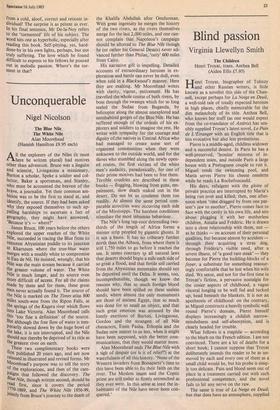Unconquerable
Nigel Nicolson
All the explorers of the Niles (it must here be written plural) had motives Other than adventure. Bruce was a linguist and scientist, Livingstone a missionary, Burton a scholar, Speke a soldier and col- lector, Baker a sportsman, and Stanley, Who must be accounted the bravest of the brave, a journalist. Yet their common am- bition was to be the first to stand at, and Identify, the source. If they had been asked Why they exposed themselves to such ap- Palling hardships to ascertain a fact of geography, they might have answered, 'Because it's — where?'
James Bruce, 100 years before the others explored the upper reaches of the White Nile, succeeded in tracing the Blue from its remotest Abyssinian puddle to its junction at Khartoum where the true-blue water merges with a muddy white to compromise in Eau de Nil. He insisted, wrongly, that his Nile was the main stream because it carried the greater volume of water. The White Nile is much longer, and its source even more difficult of access. For all the claims made by them and for them, these great men never actually found it. The source of the Nile is marked on The Times atlas 800 4111es south-west from the Ripon Falls, at the springs of the Kagera river which flows into Lake Victoria. Alan Moorehead calls „this 'too fine a definition' of the source. Mit although the free flow of water is tem- Porarily slowed down by the huge bowl of the lake, it is not interrupted, and the Nile should not thereby be deprived of its title as the greatest river on earth.
These two complimentary books were first published 20 years ago, and are now reissued in illustrated and revised forms. Mr Moorehead's purpose was to tell the story Of the explorations, and then of the cam- Paigns that followed the discovery. The Blue Nile, though written second, should be read first, since it covers the period 1770-1869, and The White Nile 1856-99, jointly from Bruce's journey to the death of the Khalifa Abdullah after Omdurman. With great ingenuity he merges the history of the two rivers, as the rivers themselves merge for the last 2,000 miles, and one can- not complain that Napoleon's campaign should be allotted to The Blue Nile though he (or rather his General Desaix) never ad- vanced further than Philae, 'only' 600 miles from Cairo.
His narrative gift is impelling. Detailed accounts of extraordinary heroism in ex- ploration and battle can never be dull, even when told in a Blackwood's manner. Here they are exalting. Mr Moorehead writes with clarity, vigour, enticement. He has travelled the whole course of both rivers, by boat through the swamps which for so long sealed the Sudan from Buganda, by helicopter along the almost unexplored and uninhabited gorges of the Blue Nile. He has suffered enough of the ordeals of his ex- plorers and soldiers to imagine the rest. He writes with sympathy for the courage and dignity of.the natives in Central Africa who had managed to create some sort of organised communities when they were unknown to the outside world, and for the slaves who stumbled along the newly open- ed routes, the first victims of the white men's audacity, paradoxically, for one of their prime motives had been to free them. Terrible cruelties are described in these books — flogging, blowing from guns, em- palement, slow death staked out in the desert. Do not let us condemn them too readily. At almost the same period com- parable atrocities were occurring each side of the Mississippi. The harshest conditions stimulate the most inhuman behaviour.
The Nile's long tap-root descending two- thirds of the length of Africa forms a sinister strip peopled by gigantic ghosts. It is not a basin. It has no tributary further north than the Atbara, from where there is still 1,750 miles to go before it reaches the sea. It seems contrary to all natural laws that deserts should begin a mile each side of so great a flood, and that fertile soil carried from the Abyssinian mountains should not be deposited until the Delta. It seems, too, incomprehensible, though we know the reasons why, that so much foreign blood should have been spilled on these useless sands, where almost the only monuments are those of ancient Egypt, that so much was done for so small an object, and that such great emotion was aroused by the lonely exertions of Burton, Livingstone, Gordon and the strangest of all Nile characters, Emin Pasha. Ethopia and the Sudan now matter to us less, when it might have been supposed, with the better com- munications, that they would matter more.
Alan Moorehead ends The Blue Nile with a sigh of despair (or is it of relief?) at the wastefulness of all this history. 'None of the Western invaders from Bonaparte's time to this have been able to fix their faith on the river. The Moslem imam and the Coptic priest are still today as firmly entrenched as they ever were. In this sense at least the in- habitants of the Nile have never been con- quered.'






































 Previous page
Previous page